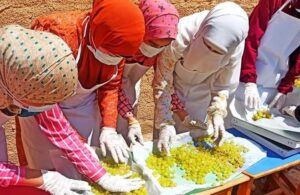How can a rotten pomegranate prompt action on climate change?
Asmaa Mahran from Assiout, Upper Egypt has the answer.
The pomegranate crop is notoriously susceptible to temperature change, resulting in prematurely decaying fruit.
“Pomegranate waste was thrown into lakes or dumped out of sight,” Asmaa told the Egyptian Mail.

Since 2021 when Mahran attended a workshop on building capacities with the Youth Love Egypt foundation (also co-host of COY-17), Mahran has devoted her energies on climate action.
Rotting pomegranate need not be left to pollute rivers and the soil. So, Mahran and the foundation bought the waste and made pomegranate molasses.
Mahran went on to say that villagers were trained in drying fruit.
“We focus on women as they are the most affected by climate change. They are also the basis for climate action. Mothers can teach their children how to protect the environment,” she said.
Mahran also participated in a campaign called ‘I Pledge’ outlining the recommendations and pledges to save the environment, such as not dumping plastic in the river.

“People feel the impact of climate change, but they don’t know what climate change is,” she said.
Mahran, who is deeply involved with action for the economic empowerment of the marginalised and helping school drop-outs, is currently working on several initiatives to raise public awareness of environmental issues. She intends to take part in World Clean-up Day activities in Egypt.
This is one of the hundreds of small – and large-scale projects being carried out nationwide to be considered for showcasing at COP27 in Sharm el-Sheikh this November.

Engy, from Sharqiya, is concentrating on linking public health with climate action. She has been working on empowering those who suffer from HIV and on gender-related issues. A workshop on climate change brought together these three strands – climate change, gender and public health – as a basis for future action.
“Fluctuations in temperature, for instance, negatively impacts the immune system, which is why I decided to integrate the environmental dimension in my work,” Engy said, adding that she had been working on raising awareness of climate action through a number of workshops in Sharqiya.
“There will be more activities in the upcoming period in this regard.”
Prime Minister Moustafa Madbouli recently launched the National Initiative for Smart Green Projects under the supervision of Minister of Planning and Economic Development Hala el-Said and Ambassador Hisham Badr, initiative coordinator.
The initiative, part of the National Climate Change Strategy 2050, will outline a map for each governorate’s smart green projects, connecting them with funding agencies and investors.
Winning projects will be showcased at COP27, but many others will deserve mention until then.






Discussion about this post